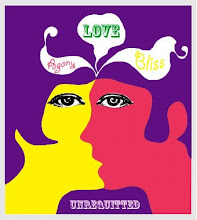Brett Morgan's CHICAGO 10 played at the Walker Art Center last night in front of an audience who chose to skip the debate between Sarah "aw-sucks" Palin and jumpin' Joe Biden.
Fact or fiction? Documentary or drama?
Morgan's hagiography to Abbie Hoffman is yet another film that attempts to canonize the colorful and exuberantly inspiring leader of the Yuppie movement founded by Anita and Abbie Hoffman as well as Paul Krassner. The first film to take on the Hoffman legend was Robert Greenwald's 2000 film STEAL THIS MOVIE.
Without question, CHICAGO 10 places a lot of the focus on Hoffman very much at the expense of the other more politically important figures: David Dillenger, Tom Hayden, Jerry Rubin, and Black Panther Bobby Seale.
While Hoffman is a colorful extrovert and easily captured for film, the extent and depth of his political philosophy was to shout "Fuck You" and "Fuck the system" as often and loudly as he could. Other participants and witnesses to the movement often found Abbie to be thwarting their gains with his yippie non-sense.
Hayden, Dillinger, and Rubin had wider reaching political philosophies with implications for transforming American government while Hoffman was primarily a proponent of an anarchist drug culture which ultimately brought Hoffman's life to an end but never held any promise for a country worth living in.
Morgan's storytelling challenge is considerable as much has been written and debated on the 60s and 1968 in particular. And before the film, Morgan tried to contextualize this fictionalized documentary by explaining CHICAGO 10 simply is a film and that we all have subjective or individual truths. Certainly, since this film was completed and premiered at Sundance in 2007, it has become under intense scrutiny from all the factions of the left who rightly feel it is thin on content, context and clarity.
If nothing else, the film does blur the distinctions between what is documentary and what is drama or fiction. And that is one of Morgan desired outcomes with viewing his films is to raise this very question.
During the evening with Morgan, he repeatedly made the point that he was merely a fetus when the Democratic National Convention of 1968 happened and thus not a direct observer of the actions. He emphatically stated that he didn't care about objectivity or truth but that he wanted to tell his story as a filmmaker in mastery of the medium.
I've always felt filmmakers who take this auteur position are selfish and often self-indulgent. They are raw and uncooked. Obviously, documentary filmmakers begin from a position of their self-indugent truth but can only be enriched by the facts, by other perspectives and the burden of reaching a higher truth than their subjective reality will allow.
Contrast Morgan's stated purpose with Errol Morris and I think, although Morris fully acknowledges his subjectivity, Morris puts himself in service of the truth and overcomes his subjective lens with meticulous emersion into the waters of the facts, of the evidence, and through a scrupulous interrogation of the witnesses. This is where Morgan's methodology falls short of Morris' exacting standards.
In the end Moragn said he didn't want to put a post-mordem on the film's end cards because he wanted this movie to mythologize the Chicago 10 and their story. I was immediately struck with the question of whether it needs "mythologizing" and instead demystifying.
Yet, I felt CHICAGO 10 was very entertaining. The drive behind the story to its dramatic conclusions was reached when Dillinger and Allen Ginsburg lead the new generation of anti-war youth in a march from the Ampitheater toward the Chicago Coliseum where the 68 Convention was being held. Knowing that they would be beat to a bloody pulp by the Chicago police and the National Guard, the marchers went anyway as a matter of principle and angry defiance.
The Chicago police had been beating the protestors for days with little more than the protestors trying to shield their heads from the bloody batons and noses from the suffocating tear gas. The correlations between the exaggerated actions and force of the Chicago police and the Saint Paul police at this years RNC convention are striking. Members of the RNC Eight were in attendance at the Walker Art Center for this screening and made appeals for funds to assist in their legal defense.




